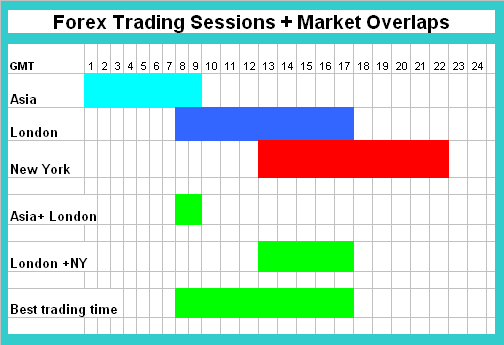Characteristics of the 3 Major Sessions: Asia, Europe & USA
Asian Session
During the Asian market only 8 % of total daily transactions go through Tokyo desks. This is the least active of the three major market sessions. Most of this 8% only involves yen based stock indices instruments with very little transactions happening for other stock indices instruments. This is the reason why it's not suitable to trade during this period. Not trading this period will save you a lot of time & money.
European Session
The London/European market takes the lion's share of the total transactions, 34% of all transactions are carried out during this session. London timezone is also well placed in terms of business trading hours for both eastern and western economies, this is when there are market overlaps and this results in high number of transactions during the this period. This time is most liquid and most volatile session for all the stock indices instruments.
The Europe time zone also includes the EUR zone member countries. The EUR zone has 17 members & major banks of these countries are open & there is a lot of liquidity as many transactions are being executed.
US Session
The US market takes up 20% of all transactions. The most active time for trading is approximately from 8 am to 12 pm when both London and New York dealing desks are open. This is the market time when there's generally the highest market volatility as it is also the market time when the majority of the major US financial reports announcements are released.
European US Session Overlap
There are periods which have a greater volume of trade transactions, thereby increasing opportunities to make profit.
For day traders the most productive hours are the London and the US session overlaps and this is the peak for stock trades is when these two overlap when there is a large volume of transactions and the market is most active.
During this over lap a substantial amount of economic news data is released generating a lot of price volatility & the prices move fast and there is a lot of trading opportunities to open trades, this over lap offers the best market trading opportunity for those traders wanting to maximize profit.
The best hours for trading, are during this market over lap because the prices really move and the moves are decisive and offer the best chance to make profits
This is also why Asian traders, Japan will wait until afternoon to begin executing their orders, this is the period that will coincide with the Europe & USA market sessions.
Asian investors will not open stock indices transactions during the Asian time, therefore as a trader from anywhere in the world it is best to stay away at this market time, after all even the hedge funds and other pro investors from Asia will avoid this time and wait for until afternoon when it is much easier because of the liquidity during the US and UK overlaps.
Therefore to come up with the best hours using based on these three marketmarket sessions as shown below:

Market Hours and Overlaps
The chart above shows the timetable of when each market session starts & when it ends. Chart also shows when there are overlaps and also shows the best hours based on these overlaps.
Summary:
Determine Your Schedule
The type of trader you are determines your schedule. If you do not have a lot of trading time then a longer term strategy would suit you best. If on the other hand you've a lot of time then you might decide to set a day trading schedule where you open stock indices transactions during the most active market hours. The above chart shows the best GMT times to be in the market - from around 800 GMT and 1800 GMT.
Determine your timeframe
To set up a schedule you need to determine your chart time frame. Try using different chart time frames until you find the most suitable and comfortable to use in accordance with your schedule.
Test your stock indices strategy
Test your stock indices strategy on a practice practice trading account for a period of time. Keep track of every transaction and monitor the progress of your schedule. Try to analyze what times are the most profitable for your trading strategy.
Your strategy should be specified on the trade plan that you use.
To learn more about how to specify this in your plan, read the tutorial about Stock Indices Trading plan. This learn stock indices tutorial will show you an example of a format that you can use to specify your schedule.


